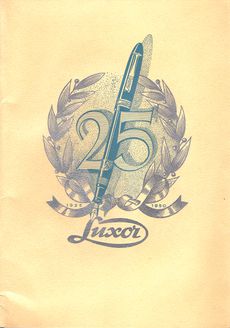Differenze tra le versioni di "Luxor/en"
(Aggiornamento come da nuova versione della pagina di origine) |
|||
| Riga 2: | Riga 2: | ||
[[Image:1950-06-Luxor-Booklet25th-p01.jpg|thumb|upright|Cover of the book celebrating [[Luxor]] 25 years]] | [[Image:1950-06-Luxor-Booklet25th-p01.jpg|thumb|upright|Cover of the book celebrating [[Luxor]] 25 years]] | ||
| − | + | La [[Luxor]] venne fondata nel [[1925]] a Heidelberg da ''Heinrich Hebborn''. La giovane età gli evitò la partecipazione diretta alla prima guerra mondiale, ed iniziò a lavorare molto presto in una cartiera finché intorno al 1921 conobbe ad Heidelberg ''Rudolph Weber'', socio di riferimento della Kaweco, con la quale iniziò a collaborare diventando responsabile della filiale di Colonia. Nel 1925 si associò ad un commerciante di origini ebraiche, ''Leo Boettigheimer'' (che morirà poi nel campo di Auschwitz nel 1943) e ad un venditore [[Kaweco]], Heinrich Schlicksupp. I tre insieme dettero vita alla ''H. Hebborn & Co.''. | |
Although the company official name was ''H. Hebborn & Co.'' it was universally known by the name of its main brand: [[Luxor]]; besides this, maintaining an inspiration to the themes of ancient Egypt, it also used as a sub-brand ''[[Sphinx]]''. In [[1938]], the company moved production facilities in Cologne. | Although the company official name was ''H. Hebborn & Co.'' it was universally known by the name of its main brand: [[Luxor]]; besides this, maintaining an inspiration to the themes of ancient Egypt, it also used as a sub-brand ''[[Sphinx]]''. In [[1938]], the company moved production facilities in Cologne. | ||
| Riga 8: | Riga 8: | ||
In the '40s, the company invented a telescopic [[piston filler]] with two concentric sections which allowed to have a much shorter mechanism, resulting in more space for the ink reservoir. The mechanism was mounted on a model called [[Luxor Teleskop| Teleskop]], and it seems that it is the same one that was later adopted also by [[Montblanc]] for its flagship models of the series [[Montblanc 13x|130]] and [[Montblanc 14x|140]]. | In the '40s, the company invented a telescopic [[piston filler]] with two concentric sections which allowed to have a much shorter mechanism, resulting in more space for the ink reservoir. The mechanism was mounted on a model called [[Luxor Teleskop| Teleskop]], and it seems that it is the same one that was later adopted also by [[Montblanc]] for its flagship models of the series [[Montblanc 13x|130]] and [[Montblanc 14x|140]]. | ||
| − | + | Altri nomi noti di modelli prodotti dall'azienda sono i seguenti: ''[[Luxor Visible|Visible]]'', ''[[Luxor Grandvisible|Grandvisible]]'' ... | |
The activities of the [[Luxor]] ended around the 70s with the acquisition by the [[Parker]] German branch, and today the brand is no more. | The activities of the [[Luxor]] ended around the 70s with the acquisition by the [[Parker]] German branch, and today the brand is no more. | ||
Versione delle 02:07, 25 giu 2017
| Luxor |
|---|
| Brand pages |
| Brand advertising |
| Brand photos |
| Other documents |
| Patents |

La Luxor venne fondata nel 1925 a Heidelberg da Heinrich Hebborn. La giovane età gli evitò la partecipazione diretta alla prima guerra mondiale, ed iniziò a lavorare molto presto in una cartiera finché intorno al 1921 conobbe ad Heidelberg Rudolph Weber, socio di riferimento della Kaweco, con la quale iniziò a collaborare diventando responsabile della filiale di Colonia. Nel 1925 si associò ad un commerciante di origini ebraiche, Leo Boettigheimer (che morirà poi nel campo di Auschwitz nel 1943) e ad un venditore Kaweco, Heinrich Schlicksupp. I tre insieme dettero vita alla H. Hebborn & Co..
Although the company official name was H. Hebborn & Co. it was universally known by the name of its main brand: Luxor; besides this, maintaining an inspiration to the themes of ancient Egypt, it also used as a sub-brand Sphinx. In 1938, the company moved production facilities in Cologne.
In the '40s, the company invented a telescopic piston filler with two concentric sections which allowed to have a much shorter mechanism, resulting in more space for the ink reservoir. The mechanism was mounted on a model called Teleskop, and it seems that it is the same one that was later adopted also by Montblanc for its flagship models of the series 130 and 140.
Altri nomi noti di modelli prodotti dall'azienda sono i seguenti: Visible, Grandvisible ...
The activities of the Luxor ended around the 70s with the acquisition by the Parker German branch, and today the brand is no more.
External references
- http://www.fountainpennetwork.com/forum/index.php?/topic/205127-older-luxor-and-parker-sets
- https://forum.fountainpen.it/viewtopic.php?f=28&t=12237#p148691